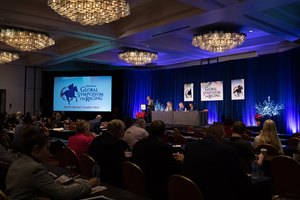NTRA Executive Rooney, HISA Part of RTIP Symposium


Registrations for the University of Arizona Race Track Industry Program's Global Symposium on Racing—the sport's biggest and most inclusive annual conference—are surging to their highest level in years just a few days out from its 47th renewal, Dec. 6-8. Pent-up demand after a year off due to COVID-19 is one reason, according to RTIP chair Robert Hartman, as is a slate of timely panels addressing critical issues, such as the Horseracing Integrity and Safety Act, sports betting, and field sizes.
The three-day Symposium at Loews Ventana Canyon Resort outside Tucson, Ariz., features an array of workshops and closed-door meetings Monday before two days of speakers and panel discussions open to all attendees. For the first time, a live stream of the Symposium will be available online for $195 with all proceeds going back to the RTIP, courtesy of Roberts Communications Network.
Three sessions devoted to HISA make up most of Tuesday's morning agenda, a deep dive that is unprecedented at the Symposium.

"I think people want to more fully understand what's happening with HISA," Hartman said. "We have a lot of regulators coming who might not be here in a normal year. They're eager to hear from the HISA leadership and understand how it's going to affect their jurisdiction. Up until recently the public discussions have been more of an overview; the Symposium will be the first time they can really talk about specifics."
Charles Scheeler, chairman of the Horseracing Integrity and Safety Authority, will present an overview of HISA, followed by reports from members of the Racetrack Safety Committee and the Anti-Doping and Medication Control Committee. An afternoon session will focus on HISA's impact on Quarter Horse and harness racing with Janet VanBebber, the American Quarter Horse Association's chief racing officer who had a storied career as an owner and trainer, and Russell Williams, president of the U.S. Trotting Association.
Also Tuesday morning, keynote speaker Tom Rooney will make his first formal address to the industry since being named president and chief executive officer of the National Thoroughbred Racing Association. The former U.S. congressman and longtime horse owner and breeder is expected to outline his vision and priorities for the organization.
Other Highlights

A quartet of track executives on Tuesday afternoon makes up the most power-laden session of the conference. Shannon Arvin of Keeneland, Aidan Butler of 1/ST Racing, David O'Rourke of the New York Racing Association, and Josh Rubinstein of Del Mar will discuss what they believe the industry needs to focus on in the near term, including more cooperation between tracks.
"The older leadership is retiring and these four represent the next generation of leaders," Hartman said. "People really want to hear where this group thinks the industry is heading."

For better or worse, the only traditional aspect lacking in this Symposium agenda is any session that could be regarded as "feel-good." Instead, the lineup conveys an urgent need to confront serious matters for which the industry is running out of runway.
Dec. 8 kicks off with ideas on how to grow field sizes even as the overall number of races and starters shrink at alarming rates. Ben Huffman of Churchill Downs and Keeneland, Rick Hammerle of Oaklawn Park, Mike Lakow of Gulfstream Park, and Tom Robbins of Del Mar will reflect on the innovations and investments that attract new runners and, in turn, grow handle and the bottom line.
Later in the day, experts from Florida and New York will discuss strategies to protect funds from other forms of gaming that support the racing industry. Legislators interested in "decoupling" casinos from their obligations to racetracks could spell the end for racing in their states, as happened with harness racing in Florida.
Other forms of wagering to be examined on Wednesday are sports betting and fixed odds on racing. In the sports betting panel, executives from FanDuel, Caesars, ATG, and Sporttrade will explain how horse racing fits into their plans. The fixed odds session will recap what has and has not worked in New Jersey, as well as how future legalization might look in Colorado and other interested jurisdictions.
Racing Secretary Summit
Monday's inaugural Racing Secretary Summit is proving to be the main driver behind first-time Symposium registrations. The 4 1/2-hour workshop grew out of a brainstorming session between Hartman and former NYRA senior vice president of racing operations Martin Panza, which also produced the field size panel.
"Racing secretaries have never had an opportunity like this to meet their peers, interact, and learn from one another," Hartman said.
Sponsors Equibase and InCompass are offering up to $750 in travel credits to encourage attendance among racing office staff. The Racing Secretary Summit does not require Symposium registration.
"If you just stay for that one night, $750 can easily cover your entire trip—flight and hotel," Hartman said. "If somebody from a racing office learns about just one or two things that InCompass can do that they didn't know about, that can save hundreds of man-hours and be worth tens of thousands of dollars."
New RTIP Leadership
This will be the first Symposium organized by Hartman, who was hired to succeed Wendy Davis as head of the RTIP in June.
"This is the key fundraiser for the program," he said. "Without a healthy Symposium, all of our other efforts become endangered. I just want people to go back to their racetracks and offices and tell people how much they learned. That's how we'll get even more people next year."
